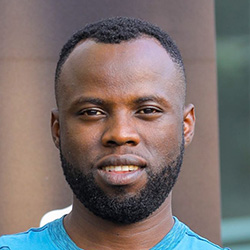

MUSIC has always a big weapon for singer Eric Senderi Nzaramba to help Rwandans, especially genocide survivors, remember their lost families and their journey of rebuilding the nation toward a better future.
The singer’s music has been instrumental to healing the scars of genocide survivors while he also helping them to regain hope for a better future.
Born in Kirehe District, the 43-year-old started singing when he was a primary school student often winning at his school’s music competitions.
He joined the RPF-Inkotanyi army after the 1994 Genocide against the Tutsi in the quest to liberate the nation.
After the liberation struggle, Senderi was demobilized from the national defense to start a new life in the community.
That was when he thought of using his talent to contribute to the country’s journey to recovery from the Genocide tragedy. He started to compose songs to pay tribute to the victims killed in different parts of the country, an initiative he shared, from the beginning, with his compatriot Dieudonne Munyanshoza.


His decision to concentrate more on this type of music, the artiste says is based on his past, what he and other Rwandans, in general, experienced.
"I sang what I saw. I saw people being killed and I saw RPF-Inkotanyi rescuing survivors during the Genocide. Some compose commemoration songs based on testimonies and what history says, but, for me, I composed songs based on what I saw,” the singer said.
"I started with songs focusing on killings executed in Churches, as holy places where people hoped to find escape. Some priests let their lambs [Tutsi victims] down yet they were supposed to show them that they were together. I focused on such sad history,” he says.
Senderi’s commemoration songs contributed in helping genocide survivors remember their lost relatives during the Genocide as well as to preach forgiveness, the resilience of Rwandans since the horrific events and hope for a better future.
They also educate the young generations about the history of the Genocide against the Tutsi through music.
His song ‘Nyarubuye Mwari Beza’, for instance, reflects the killings of Tutsi victims who fled to Nyarubuye Catholic Church which is located at his birth place Nyarubuye Sector in Kirehe District.
The Church got its name after ‘Nyarubuye massacre’ following the killing of an estimated 20,000 civilians on April 15, 1994. A Genocide memorial was built at the Church.
"The song means a lot to me because my parents, my relatives, neighbors and whoever I knew at that place was killed at the church,” he said.
Nyarubuye Genocide memorial is home to remains of over 50,000 Tutsi. Most victims were from Kirehe and neighboring Ngoma District.
"The place was visibly good and its people were good but it was sad to see the whole place destroyed when I returned home from the liberation struggle,” he recalls.
All I sing reflects on the grief, the sorrow and the general history of what Rwandans had gone through during the Genocide.
Apart from Nyarubuye, Senderi released similar commemoration songs reflecting on the killing of Tutsi victims in rivers, stadiums and, most especially in churches, from Kiziguro, Nyanza, Gasabo, Nyarugenge and Nyaruguru among others.
Hope for the future
Senderi, who, now has over 50 genocide commemoration songs to his name, said his mission is to inspire the young generation to overcome the effects of the 1994 Genocide against the Tutsi.
Music has played a big part in the healing process of Rwandans, especially Genocide survivors.
After spending years of singing about what Rwandans had gone through, Senderi started to include new themes in his commemoration music as he started to sing songs that uplift Rwandans’ spirit, give hope for a bright future and focus on building the future while learning from the past.
"I had to change themes of course and started singing about what progress the country is making in the rebuilding process. I also sing songs of hope because our leadership is doing all it can to build a future that Rwandans can draw inspiration from,” he said.
Some of his songs with this message include ‘Ikizere’ and ‘Turiho’, among others.
He also sings songs of victory to celebrate the victory of RPF-Inkotanyi during the liberation struggle.
"Without RPF-Inkotanyi, no one knows where Rwanda would be. It is important to celebrate their sacrifice made to bring life back to Rwandans. I am sure that whoever played his part, alive or gone, is proud of the achievement,” he said.
His brand-new song ‘Mwaritanze Nkotanyi’, for instance, explains it all.
The song, which features 100 children, thanks RPF-Inkotanyi for liberating the nation, and rebuilding the nation while he also vowing not to let them down by contributing to the national development in all ways possible.


